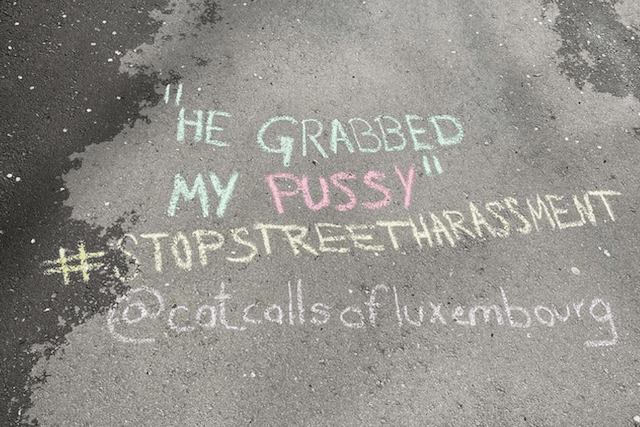For Luxembourg student Anni Schmitz the catcalling began when she was around 12. “There would always be cars that would honk or guys who would scream something out of the window. I realised from talking to people that you just shut it out,” the psychology major who lives in Amsterdam says.
11 years later, and it still happens. “Yesterday, walking around in Amsterdam, I got catcalled three times. It’s insane!,” Schmitz adds.
In 2021, she decided to tackle the issue head on. Inspired by the Cat Calls of New York City project, she set up the Cat calls of Luxembourg Instagram page, posting pictures of people’s stories written in chalk on the pavement. In parallel, she created an anonymous reporting platform for catcalling victims to share their experiences.
Giving victims a voice
“My point is to give these victims of catcalling a voice, so they know that they are not alone and what happened to them isn’t OK. You’re allowed to talk and you don’t have to be ashamed of what happened,” she says.
Schmitz felt it was also important for her to raise awareness among men, who are not aware that this still happens on a regular basis. The response exceeded her expectations. Schmitz has received over 150 reports, some of them were not only limited to catcalling, but also inappropriate touching. “I get lots of stories like that as well. Sadly, it’s not surprising. Some people tried to report it, but nothing came back. Others tell me they were too scared that no one would take them seriously, which I also understand.”

Anni Schmitz, pictured, says that for her being catcalled began around the age of 12
While Luxembourg has laws against sexual assault, there is no legislation against verbal street harassment. It means that there is little reliable data that could show how widespread catcalling is in the grand duchy. Global campaign group Stop Street Harassment reports that the topic is “under-researched (though that is changing) but each existing study shows that street harassment is a significant and prevalent problem.”
Feeling unsafe
The impact on victims, says Schmitz, should not be underestimated. “So many people said that they didn’t know how to talk about it. They thought that it wasn’t important. But it made them feel bad.”
She adds that it in some cases, street harassment made women change how they dressed so as not to attract unwanted attention. In all cases, Schmitz says, she felt unsafe when it happened to her, and worried that talking back may exacerbate the situation.
She has, however, found a response that works. “Something that really works when being catcalled is barking back [at the catcaller]. It sounds really stupid but that really works. Usually, the catcaller ends up being very confused,” she says.
